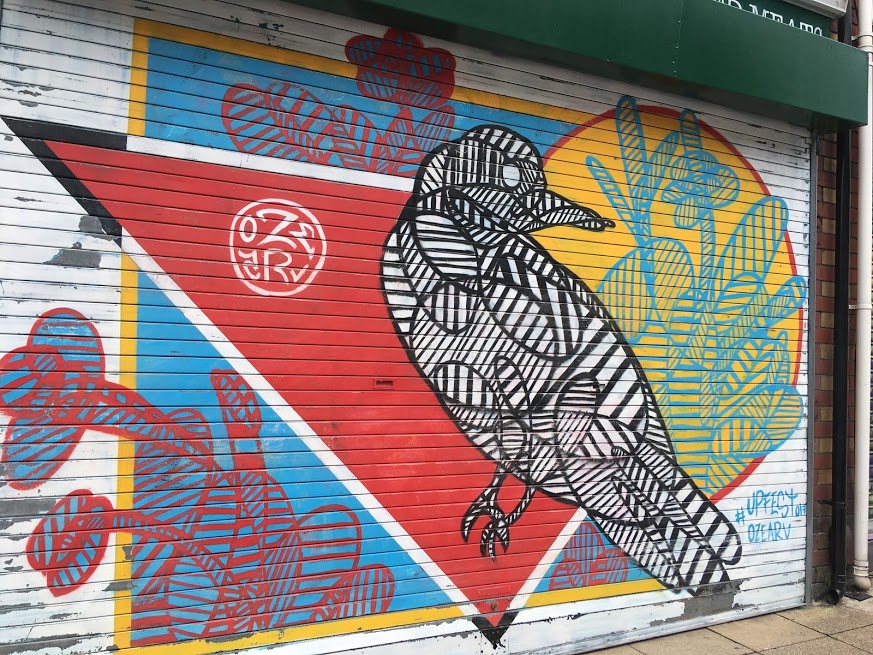This Week’s Bit of String: Heartbeats down the hall
“Just wait here while I check something.” It’s not what we like to hear at a doctor’s appointment, but I had bigger worries. Twenty years old, 7.5 months pregnant and still chronically nauseous, single and forced to drop out of college, desperately missing my ex-boyfriend and working 45-50 hours per week on my feet in 80-90 degree heat, I now had a fever and was just tired.
The doctor disappeared from the little exam room into the indecipherable warren of the obstetrics unit. If I refused to wait, I’d never find my way out, but at least it was air conditioned. I rested my elbow on a table of magazines and closed my eyes while my son did chinups on my ribs.
Somewhere in the labyrinth another expectant mum listened to her baby’s heartbeat. I could hear the Doppler machine through the walls, a steady rhythm behind my exhaustion.

And a woman’s voice, maybe the mother, maybe a companion, maybe a hallucination. Her chatter flowed high and melodious. She broke off to laugh, and in other moments broke into song: “On My Own” from Les Miserables. A languid, lonely line or two then more cheery talk, while the baby’s heart sounded.
When I first found out I was pregnant and got dumped (we married way later though, so don’t worry) I often wondered how I’d make it through months of this uncertainty before holding my baby. Waiting is hard, especially when everything else is a mess. The waiting and the uncertainty are huge emotional drains during the pandemic, don’t you think? We don’t know when we’ll be reunited with distant loved ones, we don’t know whether the economy will sustain itself, or indeed whether pasta will be available at the next grocery trip.
In this environment, we wait for my son’s A-Level grades. Until next Thursday, we won’t know what university he can go to, or where he’ll live, or how long he’ll need to stay there. It feels like a high stakes waiting game but I’ve gotten better at this.
Practice Makes Perfect
Writers do a lot of waiting. We wait for feedback from beta readers, for competition results, acceptance from agents, publishers, literary magazines, we wait for reviews and we wait for regard. The competitions we enter in May may not give us results till October.
The other thing we wait for is availability. Time spent on the day job or on housework or even socially can feel like waiting, biding our time till we can be alone with our ideas and mould them into art. Certain distractions can be helpful, and at other times they make us resentful. I’m worst at this kind of waiting, the when-will-it-be-five-o’clock-so-I-can-finally-write-down-the-flash-piece-I-invented-during-my-lunch-hour-hike kind. Is producing thousands of pounds worth of energy bills really more important that delving into the imagined world of Jemima Deadly, Chef to the Celebrities, and her Biscuits of Doom? (One of my current short stories in progress.)

Leading this double life helps us cope with waiting, though. By learning to pause the flow of words so we can crunch numbers or strike up dinner conversation, we know how to compartmentalise. We send a story off somewhere, padlock the mental exam room where we birthed it, and wander through the warren in our brain to a different one.
From a chamber deep in our minds is a steady pulse: Must write. Must be heard. And with it surreal strands of song and laughter like a siren’s call. While we wait, we work on new projects. As the longlist and shortlist announcements approach, we enter that original cubicle and rifle through it: what will we change if it’s rejected? Where will we submit next? How will we promote it if it’s actually successful? I ration myself a few minutes of daydreams per day, then dash away from them on a torrent of Plan Bs, Cs, and Ds.
Passing the Time
Waiting is not a passive act. It’s a discipline. The origins of the word come from the terms for being awake, for keeping watch, and even earlier than that, from pre-English for “to be strong, lively.” In addition to stocking up on alternative submission possibilities and indulging in the occasional success fantasy, how do we maintain our strength during the rigorous wait?
Release your inner magpie: Go out and gather string, writers. Chase shiny things. Diversions are better than anxiety. Your story’s out of your hands for the moment, so relish the opportunity to invent a new one.

Be practical: Plan where to submit next. I don’t like this part of being a writer, because seeking opportunities robs from the limited time I have for creating. It feels like that bad kind of waiting. But it is important, and when it’s done there’s the hope of new chances.
Stock up on positives: When you have doubts, send your work to friends, read it at a writers group, share a line in one of Twitter’s writing hashtags. It’s not the same as getting a contract or a prize, but encouragement always helps.
Remember others are waiting too: Everyone’s got something they’re keeping watch for. Support other writers and creatives so the wait doesn’t feel so long for them.
Poke your head up: Use the time to catch up on other aspects of life. We don’t want to find we were waiting for the wrong thing. I remember so little about when my son was a baby, I was so lost longing for his father.
I’m glad my son has had to practice waiting. Most 18-year-olds don’t go half a year without structure and yet manage to remain pleasantly functioning. He’s made new music, learned Italian, baked bread, set a record for speed running Lego Star Wars on ds, been an all-around best bud while I’m working from home. Whatever university he gets into, he’s ready to throw himself into it, with the knowledge that if there aren’t immediate results he can persevere.
It will be worth it. He was. And just as I survived that little fever and the long wait for his birth, and the wait to be a family, and the very busy wait to see what he’d be like as he grew, I guess I can survive the wait to see him at the end of his university term. With parenting, as with writing, when one wait ends another begins. But I think, after all we’ve been through, that one of the lyrics I overheard in the obstetrics waiting room is true: “Without me, his world will go on turning,” and this time that’s a good thing.
Lovely essay. Thanks for sharing your words!
Simply gorgeously wonderful.
Someone said to me that from the minute they cut the cord, you’re letting go as a parent and you spend most of your child’s upbringing learning how to let them go. It’s part of the waiting I guess. Lovely essay and a timely reminder for me that most of one’s life is spent waiting and letting go, so make the most of the moment, whatever it happens to be.